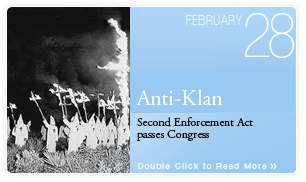Anti-Klan: Second Enforcement Act passes Congress
In the wake of the Civil War, Tennessee veterans of the Confederate Army banded together to form the first Ku Klux Klan in 1865. Very quickly Klan groups spread throught the south. Their strategy was to use violence and intimidation against blacks and progressive whites to restore white supremacy. Responding to this, the federal government passed the Enforcement Acts. The first was in 1870 and the second was passed on this day in 1871. A third, called the Ku Klux Klan Act informally, was also passed in 1871. The acts reasserted the premises of the Fifteenth Amendment, making criminal codes protecting black peoples’ rights to vote, hold office, receive equal protection under the laws. These acts were specifically crafted to help prosecutors fight Klan crimes: even if states did not prosecute a case, the federal government could. Many states were unwilling to strongly go after the Klan, either because their leaders were Klan sympathizers or because they were too weak. Additionally, the specter of a race war breaking out weighed heavily in many states so soon after the war. With these acts, prosecution of Klan crimes increased significantly, essentially suppressing the Klan for three years. President Grant also sent federal troops to areas where the violence was worst to enforce the law. A few hundred Klansmen were jailed in this period, while many others fled or received minor punishments, such as fines or warnings. By 1872, the Klan was almost nonexistent. As Klan activity waned however, new radical far-right groups emerged, such as the White League and the Red Shirts, which aided the political ascendancy of white Democrats in the South at the end of Reconstruction. By 1915, the second Klan was founded, espousing similar views and using similar tactics. By that time, there was no political will to use the provisions of the Enforcement acts to prosecute the Klan.

